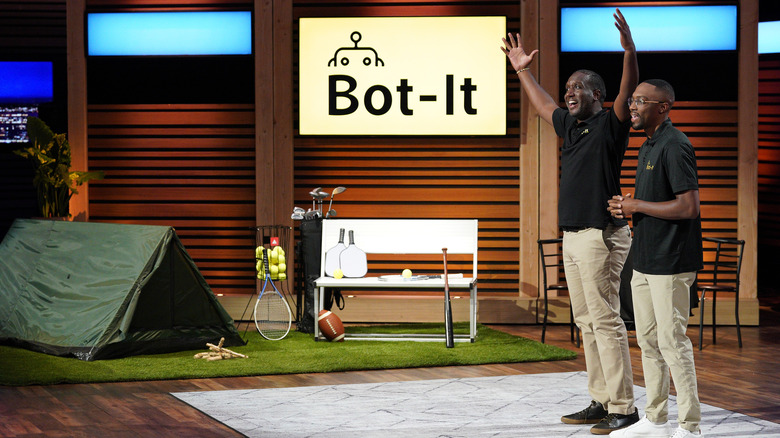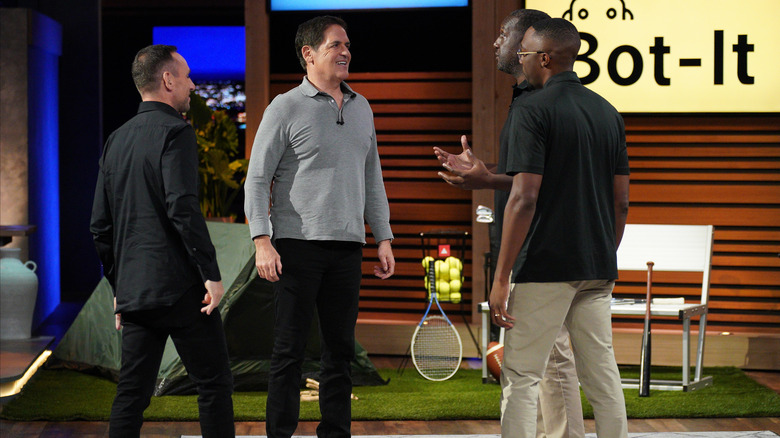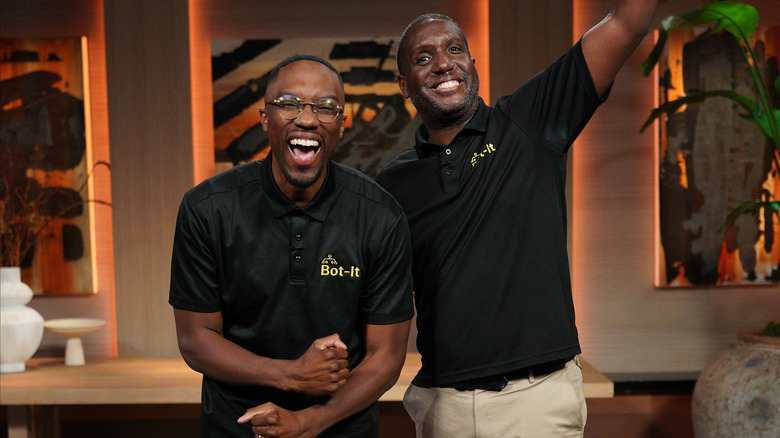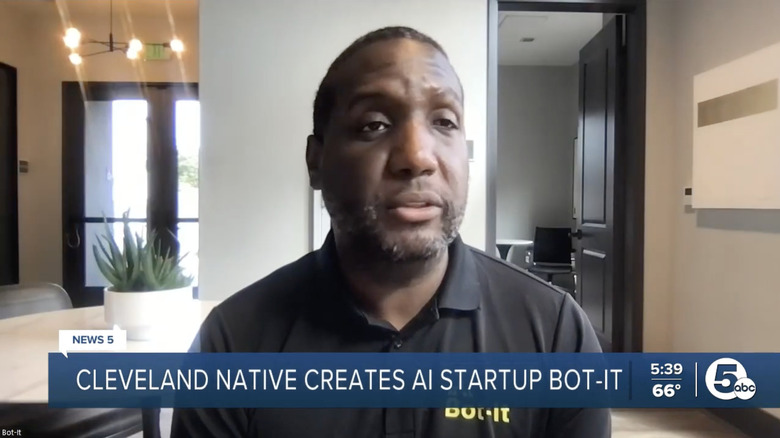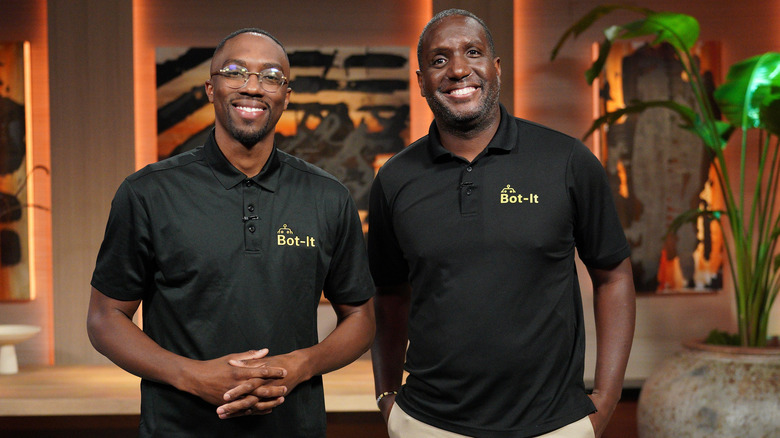What Happened To Bot-It Online Automation From Shark Tank Season 15?
We may receive a commission on purchases made from links.
"Shark Tank" has seen plenty of tech-savvy pitches over the years, such as the Fixed App from Season 7 and the CoinOut App from Season 9. And the sharks found themselves facing an especially 21st-century pitch in Season 15, Episode 3, when Maurice Bachelor and Joel Griffith of Bot-It, a consumer-oriented business building bots for the average person who wants to fight back against larger botnets that beat them to things like concert tickets, reservations, and limited edition collectibles. Both Mark Cuban and guest shark Michael Rubin of Fanatic showed interest, with Rubin, in particular, wanting to have the potential disruptor as part of his portfolio instead of on the outside.
However, as has become commonplace in "Shark Tank" updates, scrutinizing the situation strongly suggests that the deal never closed. That leaves us with a tech startup that had minimal interest before "Shark Tank" and presumably didn't end up partnering with the strategic investors who the founders felt could help grow the company. In light of this, where did Bot-It go from here? Did they at least benefit from the "Shark Tank effect" and get a bunch of new subscribers? How are the founders handling the "Shark Tank" episode in interviews? What do customers think of the Bot-It app? And has the company been able to secure any additional funding? Read on to find out.
What happened to Bot-It on Shark Tank?
Maurice Bachelor and Joel Griffith entered the proverbial tank seeking $150,000 for 10% equity in Bot-It, their web-based startup that offers bot services to the average person to give them some of the power held by, for example, ticket scalpers who use bots to jump the line for buying concert tickets. Besides concert tickets, Bachelor offered up dinner reservations and golf course tee times as bot targets that Bot-It can be used to compete with. Though Bot-It had a slate of pre-built bots available to customers, the company also sells the ability to order a custom-made, purpose-built bot.
Guest shark and Fanatics founder Michael Rubin noted that his company had been inundated with bot orders, particularly for limited edition collectibles, to the point that they had to build anti-bot software. How could Bot-It avoid such safeguards? Bachelor said that Bot-It had been made undetectable, but he didn't explain how. Asked by Rubin for sales figures, Griffith said they'd had over $30,000 in sales in about three months from approximately 350 subscribers, each paying $40 to $300. (The frequency was not mentioned.) Kevin O'Leary asked about the moral question of bots, to which Griffith said they hoped to change the perception of bots by evening the playing field.
Mark Cuban offered $150,000 for 20%, with Rubin quickly undercutting him by offering $150,000 for 15%. O'Leary, Lori Greiner, and Barbara Corcoran opted out for different reasons, but Bachelor asked about Cuban and Rubin joining forces. They said they were willing to pay $300,000 for 30%, which Bot-It accepted.
Bot-It after Shark Tank
So what happened to Bot-It after its big "Shark Tank" appearance? Did the deal with the sharks actually go through? Well, since this pitch ended with a Mark Cuban investment, our first step is checking the "Shark Tank" investments page on his official MarkCubanCompanies.com website. Bot-It is not listed, meaning that the deal never closed.
Two weeks after the episode premiered, Bachelor was interviewed by WEWS-TV, his hometown ABC affiliate in Cleveland, Ohio. At least in the footage that was used, he never outright says that the deal closed, instead talking about representing Cleveland and "the opportunity to be on a show like 'Shark Tank.'" At the segment's close, one of the anchors claimed that "since appearing on 'Shark Tank,' Bot-It has seen record sales," albeit without giving any details.
In February 2024, Griffith was profiled by The Trenton Journal, with the article dancing around whether or not the deal was consummated. The article strictly classifies it as an "offer," Griffith never says anything himself that even implies that he and Bachelor closed with Cuban and Rubin. Meanwhile, the Cleveland Jewish News spoke to Bachelor a couple of weeks after the episode aired, and though the article implied the deal closed, Bachelor was not quoted as saying so. The same article says Bot-It gained 200 subscribers in the two weeks since the episode premiered.
Is Bot-It still in business?
Though Bot-It's "Shark Tank" deal seemingly fizzled after the episode was shot, the company is still in operation. Bot-It currently offers four separate pricing tiers: Standard for $9.99 per month, Standard Plus (touted as the most popular) for $25.00 per month, Pro (hyped as the best deal) for $99.99 per year, and Pro Plus for $275.00 per year. Depending on which tier you choose, you could gain the ability to create 10 bots (Instead of five), access certain prebuilt bots not in lower tiers (like a cancellation bot, camping bot, and restaurant reservation bot), and access "1-on-1 phone support." All tiers include the ability to create custom bots as well as access to golf tee time, tennis, and pickleball bots, as well as email support.
Online user reviews for Bot-It are mixed. On the iPhone App Store, Bot-It averages a 2.3 out of 5 stars rating from 56 users, just 10 of which submitted written reviews. The issues raised by the negative reviewers pertained mainly to issues with getting subscription cancelation to work, the policy of no refunds after a bot is up and running, and difficulty getting the bot to work correctly for booking reservations at certain popular golf courses. The positive reviews, meanwhile, were largely golf course-centric, with no references to concert tickets, dinner reservations, or anything else of interest to non-golfers.
What's next for Bot-It?
The big question for Bot-It right now is how they can scale, particularly without the sharks on board. Based on stats from Google Trends (for both the search term and the larger "topic" entry) and SimilarWeb, it doesn't look like they maintained any of their "Shark Tank effect" past the immediate aftermath of the episode's premiere. And that "Shark Tank effect" was just 200 new subscribers in the first place. And with, according to SimilarWeb, an average visit duration of just over two minutes and a bounce rate of just under 50%, it seems likely that visitors to BotIt.com are generally not signing up and creating bots.
Meanwhile, it probably doesn't help brand recognition that the similarly named Botit shopping app for iOS is also out there and has better user reviews. They don't do the same thing, but it's a problem for Bot-It nonetheless.
As for the future, Maurice Bachelor commented on what's next in a January 2024 interview with Eqvis, where he revealed that Bot-It completed a funding round recently. "We plan on utilizing the funding in many different ways," he said. "We will expand on our AI capabilities to help our bots continue to build, repair, and support themselves. We want to ensure that every customer that signs up with our platform has a custom experience with our AI virtual assistant. Also, we will be expanding our sales team." Beyond that? He just wants to continue to try to even the playing field for the averaging person who competes with large-scale botnets.
"Shark Tank" is available for purchase on Prime Video.
